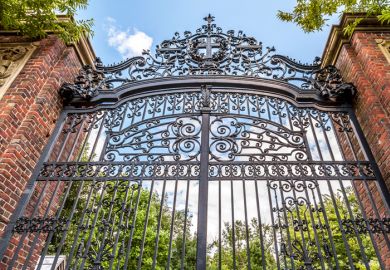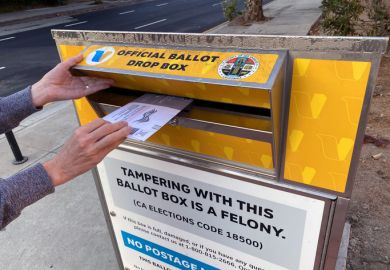The US Supreme Court is widely expected to rule against the use of affirmative action in university admissions in the wake of its decision to end half a century of legalised abortion nationwide.
The nation’s top court announced in January that it would review cases involving Harvard University and the University of North Carolina, with a verdict likely next summer.
The move raised concern that the court planned to use its 6-3 conservative majority to forbid race-based preferences in college admissions. Now those predictions have solidified.
“The current court has clearly shown its willingness to directly overturn past precedents in order to achieve conservative policy goals, and I don’t see why this case would be different,” said Daniel Hirschman, assistant professor of sociology at Cornell University.
THE Campus resource: Moving beyond statements of commitment to taking action on race equality
With the abortion decision “the court’s conservative majority has clearly demonstrated it is willing to pivot from established precedent”, said Mitchell Stevens, professor of education at Stanford University.
In the past, the Supreme Court has repeatedly upheld the basic principle of affirmative action, and the lower courts that handled the Harvard and North Carolina cases agreed that both institutions were permitted to consider race when assessing a student for admission as part of wider efforts to create a diverse campus community.
But unlike the Supreme Court reversal on abortion – which went against the position backed by a majority of Americans – the idea of forbidding affirmative action has often appeared politically popular.
In 2020, voters in California – despite being one of the most left-leaning states in the country – decisively rejected a bid to restore affirmative action to their public university system.
Such votes showed that Americans strongly support the idea of a meritocracy, but then mistakenly believe that their nation already is one, “despite overwhelming evidence to the contrary”, Dr Hirschman explained.
Affirmative action was also often dismissed as a relatively minor issue, given that highly competitive institutions enrol only a small share of US students. “Debate about admissions protocols at selective private schools in the United States is essentially a symbolic discourse,” Professor Stevens said. The number of affected students was “statistically trivial”, he said.
Dr Hirschman, a specialist in affirmative action and merit in undergraduate admissions, agreed – but highlighted that “these highly rejective institutions are the training and recruiting grounds for the next generation of elites, as the Supreme Court itself demonstrates vividly”, given that eight of the nine current justices attended Harvard or Yale law schools.
And in states with top-ranked public institutions, admissions preferences still carry real weight. Just before California voters stopped affirmative action in 1996, black applicants were winning admission to the University of California system at a rate just 6 percentage points below its overall success rate. By 2019, the black acceptance rate was 16 percentage points worse than the average.
A nationwide study earlier this year by researchers at the University of California, Los Angeles, looking just at public medical schools, found that among states that ended affirmative action, the proportion of students from under-represented racial groups fell by more than a third within five years of their ban.
A nationwide rejection of affirmative action in admissions by the Supreme Court might hopefully raise the pressure on US higher education to take other important steps in the direction of racial and economic equity, Dr Hirschman said. Those actions could include selective universities growing in size or adopting a lottery system among all applicants who meet a particular eligibility threshold, he said.
POSTSCRIPT:
Print headline: Court ‘likely’ to ban affirmative action
Register to continue
Why register?
- Registration is free and only takes a moment
- Once registered, you can read 3 articles a month
- Sign up for our newsletter
Subscribe
Or subscribe for unlimited access to:
- Unlimited access to news, views, insights & reviews
- Digital editions
- Digital access to THE’s university and college rankings analysis
Already registered or a current subscriber?








